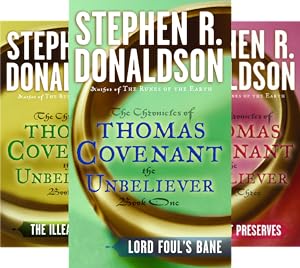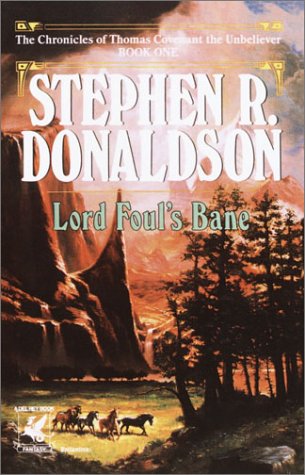
![]() Lord Foul’s Bane by Stephen Donaldson
Lord Foul’s Bane by Stephen Donaldson
Stephen Donaldson’s opening volume in THE CHRONICLES OF THOMAS COVENANT, Lord Foul’s Bane, is divisive for fans of fantasy. It strictly follows Joseph Campbell’s monomyth, which some readers may see as comfortably familiar, and others may see as unoriginal, especially when set alongside the plethora of epic fantasy available today. Parallels to THE LORD OF THE RINGS may also entice or put off readers. What’s not discordant, however, is the moral message burning at the heart of Covenant’s story. Still poignant today, it and the quality of the writing are the main reasons Donaldson’s series was once king of the fantasy charts.
Lord Foul’s Bane, and the CHRONICLES as a whole, is portal fantasy. Though Donaldson doesn’t identify the gateway in the opening volume, events begin and end in the real world. The focal point of the book is Thomas Covenant. One day discovering he has leprosy, his wife and the other townsfolk alienate him, “unclean” the word on their lips. Then Covenant encounters a mysterious beggar while paying the electric bill, and the next thing he knows he’s standing atop a pinnacle of stone, looking out over an idyllic land. Let the fantasy begin.
 Called simply the Land, the world Covenant suddenly finds himself in is fully Tolkien in flavor. Magic works in organic fashion; the people live rustic lives; rivers wind through green hills. Most importantly for Covenant, there’s also no disease. Covenant and the wedding band he still wears are declared sacred by the locals. When a great darkness threatens the Land, he is taken on a quest to meet the great council and decide the fate of mankind. But the surreal nature of the Land is overwhelming to Covenant, who protests that it is a dream. It is Covenant’s rejection of life there which is the real engine driving the quest.
Called simply the Land, the world Covenant suddenly finds himself in is fully Tolkien in flavor. Magic works in organic fashion; the people live rustic lives; rivers wind through green hills. Most importantly for Covenant, there’s also no disease. Covenant and the wedding band he still wears are declared sacred by the locals. When a great darkness threatens the Land, he is taken on a quest to meet the great council and decide the fate of mankind. But the surreal nature of the Land is overwhelming to Covenant, who protests that it is a dream. It is Covenant’s rejection of life there which is the real engine driving the quest.
The similarities are more than passing; many more of the motifs of THE LORD OF THE RINGS can be found in Lord Foul’s Bane, e.g., quests, dark lords, rings, magic. But to be fair, Donaldson’s hero is cast from a far different mold than Tolkien’s. He is an anti-hero, and it’s difficult to have sympathy for Covenant’s travails. The belief that he’s dreaming, and subsequently that his actions have no consequences, causes him to behave in anti-social fashion and commit despicable acts. His antics are at times vile beyond belief, and undoubtedly some readers will close the book forever upon reading some of them. But for those with the patience to wait and learn Donaldson’s intent, a certain understanding does arise. Without spoiling matters, suffice to say that Lord Foul’s Bane is a very personal story that is similar to Tolkien only on the surface. Everything below that is a character study of alienation and vindictiveness in the light of goodness.
 In style, Donaldson proves himself a better than average writer. There are more than a few nice turns of phrase to complement internal monologue, the descriptions are well visualized, and plot movement is smooth and consistent. The neologisms in the Land will be annoying for some readers; for example, hurtloam as a healing earth, diamonddraught as a kind of spring wine, or the name Saltheart Foamfollower, a giant who befriends Thomas. As immature as they may seem, the word pairings are intentional, as Donaldson’s aim is to emphasize the idyllic nature of the Land in contrast to our gritty real world. He succeeds, albeit in awkward fashion.
In style, Donaldson proves himself a better than average writer. There are more than a few nice turns of phrase to complement internal monologue, the descriptions are well visualized, and plot movement is smooth and consistent. The neologisms in the Land will be annoying for some readers; for example, hurtloam as a healing earth, diamonddraught as a kind of spring wine, or the name Saltheart Foamfollower, a giant who befriends Thomas. As immature as they may seem, the word pairings are intentional, as Donaldson’s aim is to emphasize the idyllic nature of the Land in contrast to our gritty real world. He succeeds, albeit in awkward fashion.
The book’s problems lie in Donaldson’s overly predictable plotting. Details of the story are unique and interesting, but the overall movement of the plot is far from original. Campbell’s work takescenter stage; Covenant’s quest follows the monomyth to a T. However, for those looking for something fresh or new, Lord Foul’s Bane may not be a good option. With each page, one can almost see Donaldson going through Campbell’s checklist: cast out of group, check; undergo trials, check … This was more original when it was published in 1977, but Donaldson’s strong effort has unfortunately become mixed up with the many faces of epic fantasy since.
In the end, Thomas Covenant and Lord Foul’s Bane will not be for everyone. Firstly, Covenant is one of literature’s great anti-heroes, which means more sensitive readers will be repulsed by his actions. Readers open to the context Donaldson is placing him in will, however, empathize with the story and be curious how it develops. Secondly, the thirty-five years that have passed since Donaldson started writing the series have not helped cement its originality. It is quest fantasy of the purest variety, and those who have read a lot of the genre but not Covenant’s story may not find anything inventive other than Covenant himself. To Donaldson’s credit, however, the quality of writing and worldbuilding are better than most.



Do it! One of the best things I've read in recent years.
This reminds me. I want to read Addie LaRue.
We’re in total agreement David!
I felt just the same. The prose and character work was excellent. The larger story was unsatisfying, especially compared to…
Hmmm. I think I'll pass.